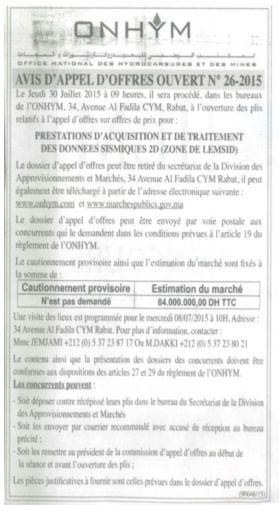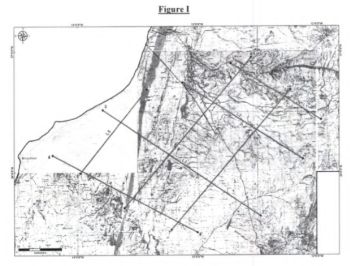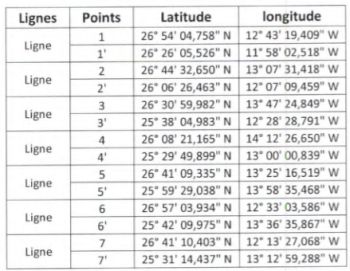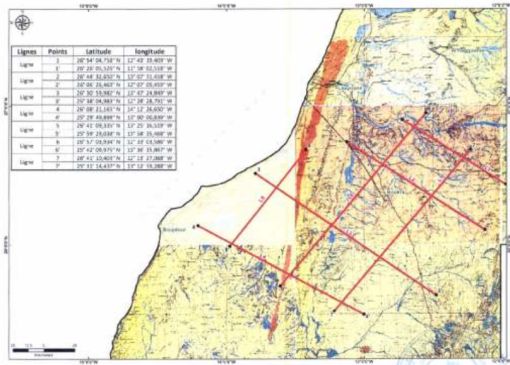
Several seismic survey companies have deeply regretted their involvement in the occupied Western Sahara over the last decade. Now, Morocco is trying to partner with yet another one - this time onshore. WSRW warns industry to not fall into the trap.

The new controversial block, Lemsid, is located in its entirety in the territory that Morocco is illegally occupying, south of the capital city of Western Sahara, El Aaiún.
The Moroccan state oil company ONHYM closes the tender on 30 July 2015, an assignment worth 84 million Moroccan Dirham. The tender can be seen in short version to the right, while the full version is downloadable here.
"The study area is located in Southern Morocco, between the cities of Smara, Laayoune, Boujdour and Guelta Zemmour", the tender states. This is incorrect. No state in the word, nor the United Nations, recognise this territory as part of Morocco. No reference in the tender documents mentions that the area is located outside of the internationally recognised borders of Morocco, nor does it refer to the legal rights of the people of the territory of Western Sahara.

According to the tender document, ONHYM takes on the responsibility to secure passage authorisations from local land users and local authorities. No Saharawi organisation or representative , however, has ever been approached in relation to the tender, as far as WSRW knows. The UN's legal office concluded for the UN Security Council that any further exploration in the territory of Western Sahara must take place in accordance with the wishes of the people of territory. No such consent has been sought. Morocco invaded Western Sahara in 1975. Half the people sought refuge abroad.
"Companies planning to take part in the plunder of Western Sahara's resources must take into account the possibility for legal consequences. Western Sahara Resource Watch calls on all companies to not engage in the Lemsid block, or any other petroleum exploration in Western Sahara until a solution to the conflict has been found. Any oil exploration in Western Sahara taking place in violation of the wishes and the rights of the Saharawis, will only lead to a further entrenchment of the Moroccan position, and will undermine the talks for a solution to the conflict", stated Erik Hagen, campaigner in Western Sahara Resource Watch.
Further exploration of the hydrocarbons are in violation of international law as long as the people of Western Sahara do not consent to it. This was the main conclusion of a legal opinion of the United Nation's Legal Office on behalf of the UN Security Council.
Previously, a number of seismic services companies have been convinced by Morocco to take on such assignments, due to ONHYM's or the operators' failure to specify the real location of the blocks. Nearly all of the seismic survey companies that have worked in Western Sahara have since regretted their involvement:
- "We admit having done a mistake. It feels very uncomfortable having contributed in supporting an occupation power", CEO of SeaBird Exploration, 2015.
- "I have no problem in stating, in retrospect, that it might have been a bad idea to take this assignment”, CEO of Spectrum ASA, 2011.

- "The company is often involved in oil and gas exploitation in areas where the local population has not been consulted. For that reason, the company has for instance stopped its involvement in Western Sahara" , Fugro NV, 2012 and its subsidiary Fugro-Geoteam "has decided to abstain from any further involvement in Western Sahara until the political situation has been resolved", 2010.
- "TGS-NOPEC appreciates the complexity of the political issues in the area [...] As a result, the Company has decided not to undertake any new projects in Western Sahara without a change in political developments", Press release, 18.03.2003.
Other seismic survey companies have been alerted in time, and specifically avoided taking on such assignments: "“We have on several occasions previously refused to carry out seismic explorations in Western Sahara", PGS, 2009.
According to Africa Intelligence, the seismic studies will be shot on the block in 2015 and 2016. The tender documents state that the study will include a series of shallow drill holes, so called 'upholes' of up to 80 meters. The rest of the study will be done using seismic study equipment as shown on the video to the right. That video was shot on the neighbouring "Boujdour Onshore" block in 2010.
In addition to the tender for seismic studies, two other tenders were published on 26 June 2015 for the same programme. One tender is for expert supervision of 2D seismic acquisition, the other for environmental supervision. The maps and geographical references to "Southern Morocco" are identical for all the three assignments.
An interview to Moroccan media earlier this year reveals that the block is 20.000 square kilometers. The director of ONHYM has also given comments on the seismic programme.

EU Court adviser confirms separate and distinct status of Western Sahara
The Advocate General of the EU’s top Court backs the legal status of the people of Western Sahara. Final Judgment expected in a few months.
EU Court adviser: fruit from Western Sahara should not be labelled as from Morocco
Labelling those products as originating in the Kingdom of Morocco instead of originating in Western Sahara breaches EU law, the Advocate General of the EU Court of Justice concludes.
COWI abandons future projects in Western Sahara
After undertaking work for the Moroccan state phosphate company in Western Sahara, the Danish consultancy giant COWI states that it “will not engage in further projects" in the occupied territory.
Report: EU-Morocco fisheries depends on illegal occupation
An external evaluation report on the EU-Morocco fisheries agreement 2019-2023 confirms that the agreement revolves, in its entirety, around Western Sahara.



